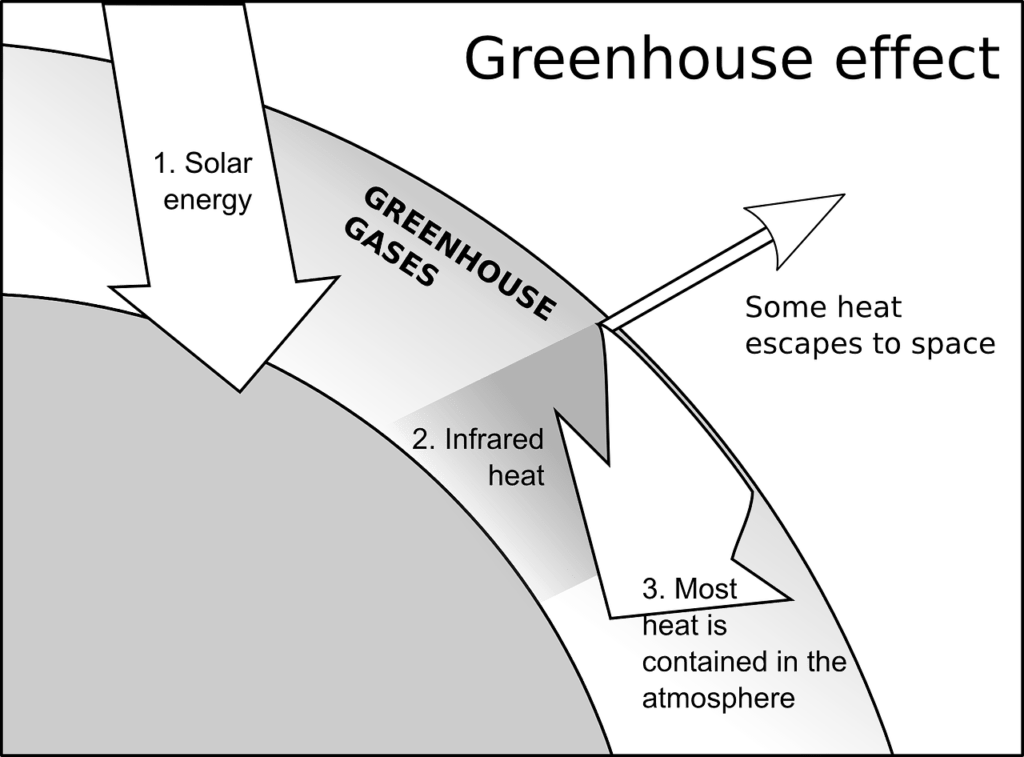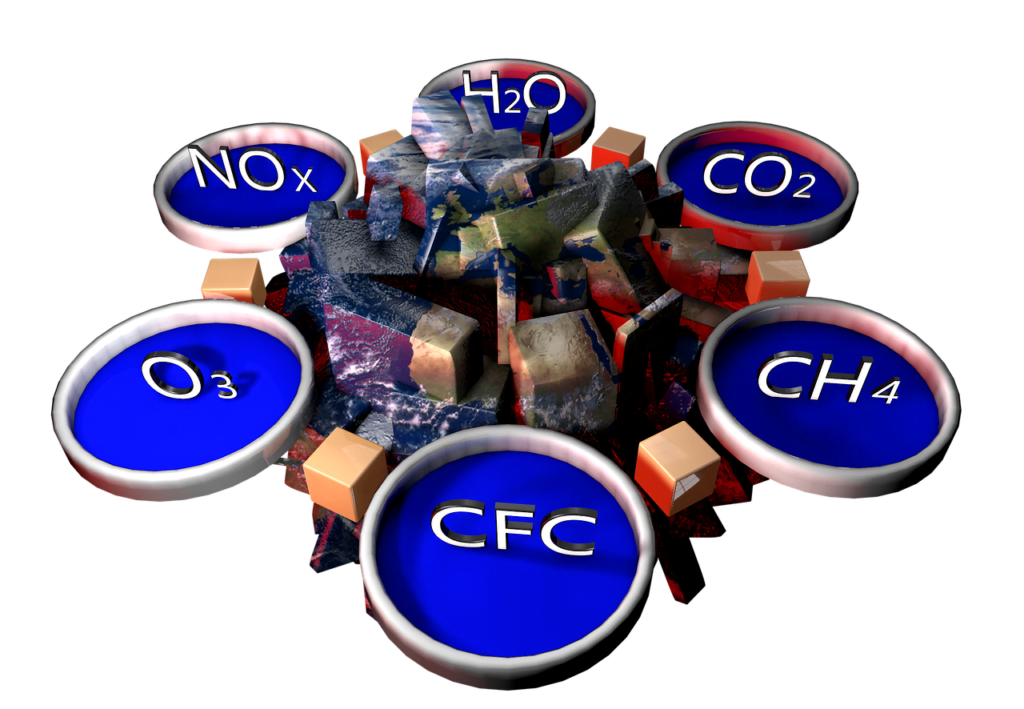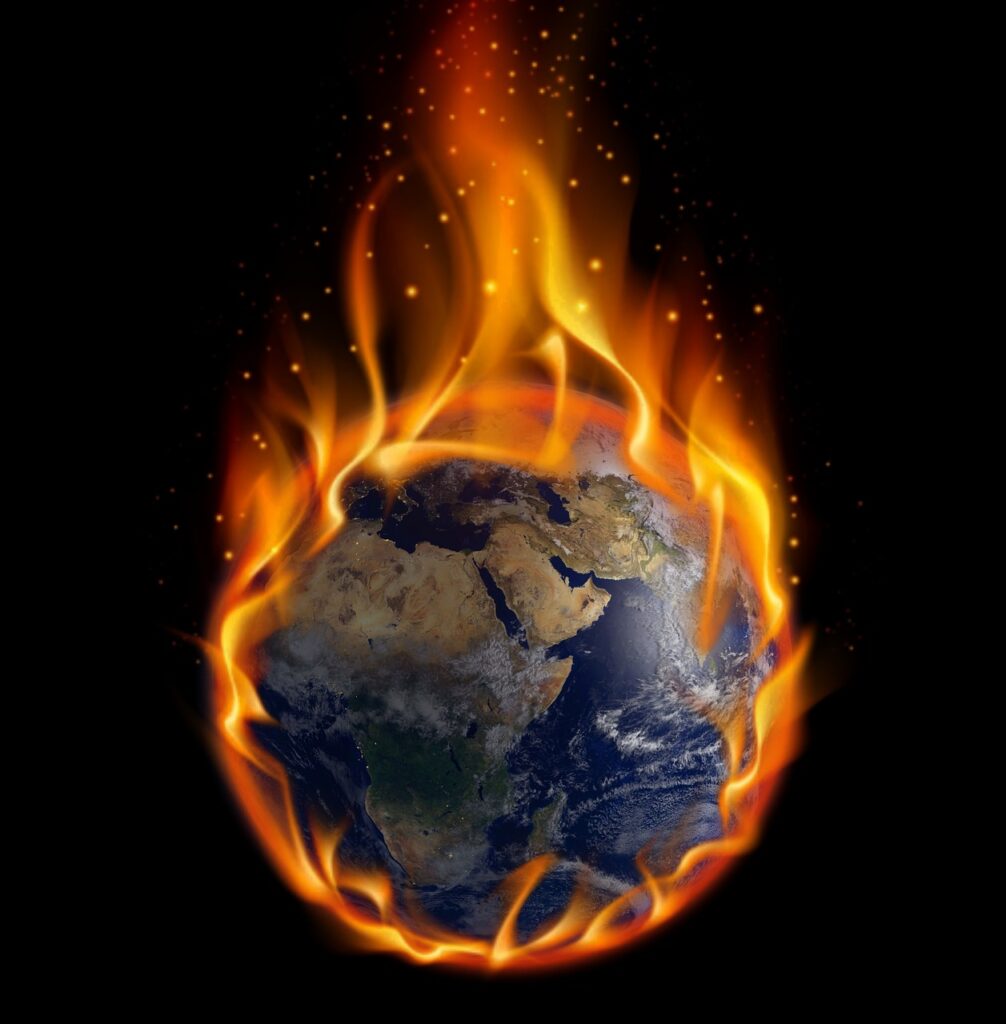- What are greenhouse gases?
- What are the effects of greenhouse effect?
- Main contributors of greenhouse gases
- How greenhouse gases contribute to climate change?
- The impact of Greenhouse Gases
- How to reduce greenhouse gases?
- The effect of greenhouse gases on the UK
- The impact of the UK government’s actions on greenhouse gas emissions
- Conclusion
What are greenhouse gases?
Greenhouse gases are those that trap heat in the Earth’s atmosphere, leading to a warming effect on our planet. The primary greenhouse gases include carbon dioxide (CO2), methane (CH4), and nitrous oxide (N2O). While these gases occur naturally in the environment, human activities have significantly increased their concentrations.
Carbon dioxide is released when we burn fossil fuels such as coal, oil and gas for transportation and electricity generation. Methane is produced by livestock farming and waste management processes. Nitrous oxide comes from agricultural practices such as fertilizer use.
These greenhouse gases act like a blanket around Earth, trapping heat close to the surface rather than allowing it to radiate back out into space. This leads to an increase in global temperatures which has far-reaching consequences for our world.
As we continue to release more greenhouse gases into the atmosphere through human activity, this will exacerbate climate change with serious effects on our environment including rising sea levels, extreme weather events and loss of biodiversity among others.
What are the effects of greenhouse effect?
The greenhouse effect is a natural phenomenon that occurs in the Earth’s atmosphere. It helps regulate and maintain the planet’s temperature, keeping it warm enough to support life. The effect works by trapping heat from the sun within the atmosphere.

Greenhouse gases like carbon dioxide (CO2), methane (CH4), and water vapor act as a blanket around the planet, preventing some of the heat from escaping back into space. This process warms up our planet and creates what we know as global warming or climate change.
While this natural process is essential for sustaining life on Earth, human activities have significantly increased greenhouse gas emissions over time. The burning of fossil fuels such as coal, oil, and gas has contributed to an increase in CO2 levels in our atmosphere.
As a result of these human activities, we are now experiencing more severe weather patterns and rising sea levels due to melting ice caps. If we do not take action to reduce our greenhouse gas emissions soon, these effects will only continue to worsen over time. It is crucial for us all to learn about how we can help reduce greenhouse gases through individual actions like reducing energy consumption or switching to renewable energy sources. We must work together globally if we hope to save our beautiful planet from further harm caused by excess greenhouse gases.
Main contributors of greenhouse gases

The main gases that contribute to greenhouse effect are carbon dioxide (CO2), methane (CH4), nitrous oxide (N2O). While some greenhouse gas emissions occur naturally, human activities such as burning fossil fuels and deforestation have increased these emissions to dangerous levels.
Carbon dioxide is the most well-known greenhouse gas because it is emitted in large quantities by human activity which contributes to 72% of the emission. It is released when we burn coal, oil, and natural gas for energy. In addition to this, deforestation also contributes to its increase in our atmosphere. Carbon dioxide stays in the atmosphere for centuries and continues to contribute towards global warming.
Methane has a much higher heat-trapping potential than carbon dioxide but does not stay as long in the atmosphere and is about 12% in the atmosphere. Methane comes from sources such as livestock farming, natural gas pipelines leaks, landfills or rice cultivation. 60% of the emission is due to human activities.
Nitrous oxide also contributes 9% significantly to global warming through agricultural practices like fertilizer use. Fluorinated gases are synthetic chemicals used in refrigeration systems and other industrial applications.
These greenhouse gases work together to create what’s known as the “greenhouse effect.” This effect traps heat close to the Earth’s surface, contributing to rising temperatures worldwide.
Reducing our greenhouse gas emissions can help slow down climate change and protect our planet’s future.
How greenhouse gases contribute to climate change?
The gases, carbon dioxide, methane, and nitrous oxide, act like a blanket around the planet, preventing some of the sun’s energy from reflecting back into space. As more greenhouse gases are emitted into the atmosphere due to human activities such as burning fossil fuels and deforestation, this blanket becomes thicker and traps even more heat.
The increased concentrations of greenhouse gases lead to rising temperatures on Earth which cause changes in weather patterns such as droughts or floods. Additionally, melting glaciers increase sea levels leading to coastal flooding all over the world.
Moreover, temperature increases can also affect ecosystems causing species extinction since they cannot adapt quickly enough to changing conditions. This domino effect could harm our food supply chain resulting in global famine.
To mitigate these consequences caused by greenhouse gas emissions we must reduce our CO2 footprint which can be done through many practices: using public transport instead of driving alone; eating a plant-based diet; purchasing eco-friendly products; and supporting organizations who prioritize green policies that combat climate change rather than exacerbate it.
The impact of Greenhouse Gases
These gases trap heat from the sun, causing the Earth’s temperature to rise and leading to climate change. This warming effect can lead to a range of environmental issues like rising sea levels, increased frequency of natural disasters, and changes in precipitation patterns.

One of the most challenging impacts of greenhouse gases is their contribution to melting ice caps and glaciers. As these frozen structures melt at an alarming rate due to global warming caused by CO2 emissions, they contribute significantly to rising sea levels.
The increasing temperatures also affect ecosystems worldwide, leading many species’ habitats into disarray or even extinction. The acidity level in oceans increases as more carbon dioxide dissolves into them from the atmosphere; this leads not only to ocean acidification but also marine life depletion.
Moreover, extreme weather conditions such as hurricanes and droughts will become increasingly common due to global warming caused by greenhouse gas emissions. These severe conditions can cause human fatalities together with ecological damage that directly affects communities worldwide.
It’s clear that greenhouse gases have already had substantial consequences for our environment globally; we must continue working towards reducing our carbon footprint if we want a healthy planet for future generations.
How to reduce greenhouse gases?
Reducing greenhouse gases is crucial in the fight against climate change. There are many ways that individuals and businesses can help reduce their carbon footprint.
One way to reduce greenhouse gas emissions is by using renewable energy sources like solar or wind power. By making this switch, you can significantly lower your carbon footprint and help save the planet.
Another effective method for reducing greenhouse gas emissions is through transportation changes. Walking, cycling, carpooling, or taking public transport instead of driving alone can drastically cut down on your carbon emissions.
Additionally, making small changes in daily habits can have a significant impact on reducing greenhouse gas emissions. These include turning off lights when not in use, unplugging appliances when not needed, buying locally-produced goods to cut down on transportation needs and composting food waste instead of throwing it away.
Supporting renewable energy sources such as wind and solar power can help reduce greenhouse gas emissions. Be mindful of where your electricity comes from and consider switching to a provider that uses renewable sources.
Businesses also play a critical role in reducing greenhouse gases by implementing sustainable practices such as investing in clean technology or adopting eco-friendly policies.
It’s important for everyone to take action towards reducing greenhouse gas emissions if we want to make a positive impact on our environment and preserve it for future generations.
The effect of greenhouse gases on the UK
Greenhouse gases have a profound effect on the UK. The country is experiencing more extreme weather conditions, such as heatwaves in summer and severe flooding during winter. These events can cause devastating damage to property and infrastructure.
In addition, greenhouse gas emissions contribute to air pollution which negatively affects human health. Poor air quality can lead to respiratory problems like asthma or even lung cancer.

The extreme heat during summer and cold during winter in UK is a prime example of global warming. One of the ways to overcome these harsh and extreme weather changes is by choosing sustainable and eco friendly lifestyle. This way, we can contribute towards reducing greenhouse gases, global warming and climate.
The agricultural industry is also affected as changes in temperature patterns can disrupt crop production leading to food shortages and higher prices for consumers.
Rising sea levels caused by melting ice caps due to global warming pose a significant threat to coastal communities with potential loss of homes, businesses, and infrastructure along the coastlines of the UK.
Despite these challenges, there are many strategies that individuals and organizations alike can implement towards reducing their carbon footprints; from using public transportation instead of driving cars or switching off lights when not needed at home or work.
The impact of the UK government’s actions on greenhouse gas emissions
The UK government has pledged to reduce greenhouse gas emissions by at least 68% by 2030, compared to 1990 levels. To achieve this target, the government is implementing various policies and measures.
One of these measures is the phasing out of petrol and diesel cars by 2035. The government plans to invest £2.8 billion in electric vehicles (EVs) and charging infrastructure to support this transition.
Another policy implemented by the UK government is the introduction of a carbon pricing scheme that will tax companies for their carbon emissions. This encourages businesses to adopt cleaner technologies and reduce their environmental impact.
The UK has introduced an industrial decarbonization strategy aimed at reducing carbon emissions from industry through energy efficiency improvements, electrification, fuel switching, and Carbon Capture Utilisation and Storage (CCUS).
There are initiatives such as tree planting programs designed to increase natural carbon capture in forests across Britain while also providing habitats for wildlife.
These policies show that the UK Government takes climate change seriously; however more needs to be done if we are going to hit our targets for reducing greenhouse gas emissions over time.
Conclusion
Greenhouse gases have a significant impact on the environment and contribute to climate change. The UK government has set ambitious targets for reducing emissions and is taking action to achieve them through policies and measures such as investing in renewable energy sources, promoting electric vehicles, implementing carbon pricing mechanisms, and improving energy efficiency standards.
As individuals, we can also play our part in reducing greenhouse gas emissions by adopting sustainable practices such as using public transportation or carpooling instead of driving alone, eating less meat, conserving energy at home by turning off lights and electronics when not in use or installing smart thermostats.
It’s essential that we all take responsibility for our actions towards the environment. By working together – governments, businesses and individuals alike – we can make a positive impact on the planet’s health today and for generations to come. Let us act now to save our planet from irreversible damage caused by greenhouse gases.


[…] we reduce the amount of methane gas produced by decomposing materials. Methane is a potent greenhouse gas that contributes to climate […]
[…] the environment. How does this work? Well, animal agriculture is one of the leading contributors to greenhouse gas emissions. The production of meat and dairy products requires vast amounts of land, water, and resources. […]